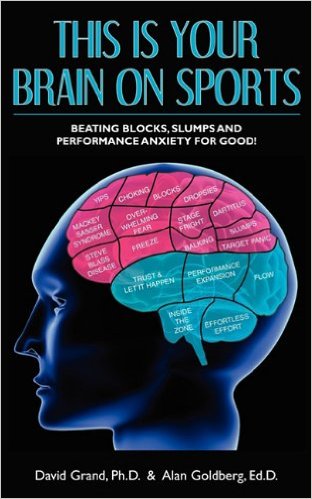Book Review

Reviewer: Phil Johnson
THIS IS an essential book for sport psychologists, coaches and of course athletes! David Grand and Alan Goldberg, each with over 20 years’ experience working in mental health and sport and both authors at the forefront of emotional healing in sport in the US and beyond, bring not only a wealth of experience to this text, but new ideas and techniques, which in essence revolutionise the way sport psychologists can work to maximise human and sport potential. For example, competition anxiety, ‘choking’, is often considered to be brought about by ‘over-thinking’, negative selftalk, and the pressure to perform, resolved traditionally through Mental Skills Training (MST). However, the authors consider this is often brought about by negative emotional past events, which have their roots in traumatic experience, and may appear unrelated as well as more immediately meaningful.
The authors demonstrate with high profile athletes how their recently developed ‘brain-spotting’ Brainspotting approach works, and the level of success it achieves in relatively short time scales. Based on the very successful Eye Movement Desensitisation and Reprocessing (EMDR) approach, Grand has taken this work to another level. Goldberg for his part, has recognised that MST approaches traditionally used in sport psychology have limits when ‘trauma’, both big ‘T’ and small ‘t’ are involved. With the use of ‘bilateral sounds’, eye movement and fixed eye positioning, the ‘brain-spot’ is
identified, where historical issues relating to a traumatic event are stored. They enable athletes to recover from such ‘blocks’, though de-activating ‘frozen’ trauma responses, which are specifically held in the physical body, as well as emotionally stored. Goldberg is also courageous in tackling parental and coach pressures on children, and how such young athletes can become demotivated and traumatised by such experience.
The authors’ responses to Repetitive Sport Performance Problems (RSPP), are tackled in the ingenious use of brainspotting, which enables physical desensitisation and emotional, ‘schematic’ reprocessing of memory to take place, and is capable of unlocking multiple as well as single traumatic events. Learn to recognise the signs and symptoms of trauma in the sporting context, and importantly know that it can be fixed. The athlete scenarios cover YIPS in golf, risk taking moves in gymnastics, goalkeeper errors in soccer, baseball, motor cycling, equestrian, as well as fear of injury.
St Andrews House, 48 Princess Road East, Leicester LE1 7DR, UK
Tel 0116 254 9568 Fax 0116 227 1314 E-mail mail@bps.org.uk
www.bps.org.uk
© The British Psychological Society 2012
Incorporated by Royal Charter Registered Charity No 229642
Southwest review Spring 2012



